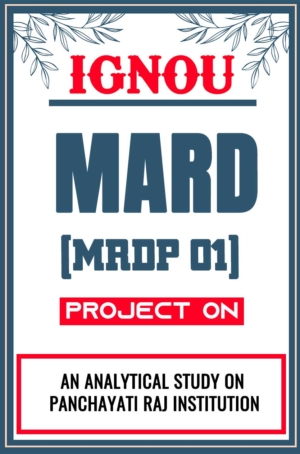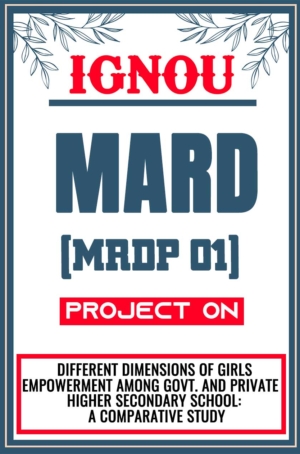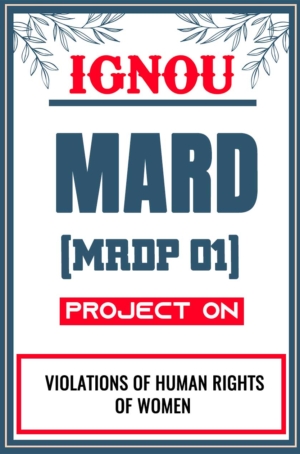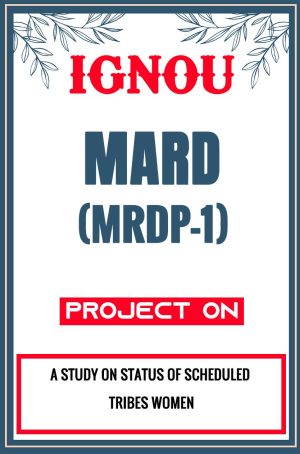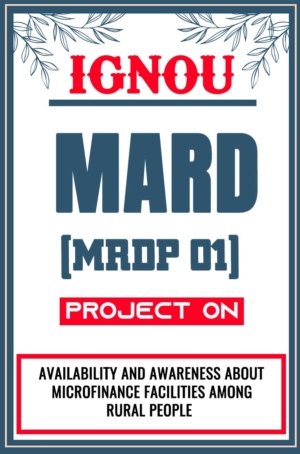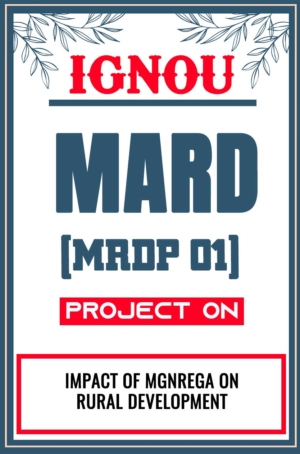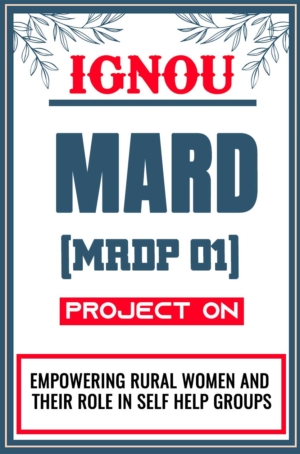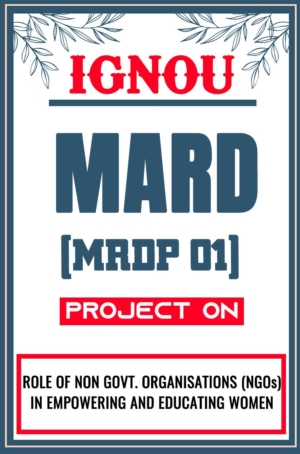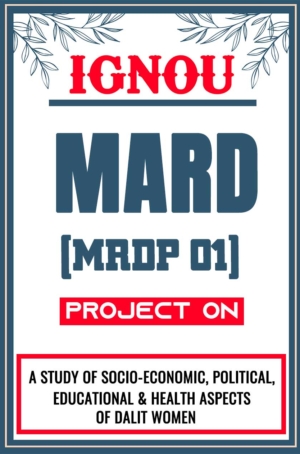Download IGNOU MARD Project & Dissertation (MRDP 1)
The IGNOU MARD Project work is a method of enhancing the quality of life for individuals who live in rural regions without access to basic services. Additionally, this IGNOU MARD Project work emphasises the development of backward people. The IGNOU MARD Project would benefit individuals employed by various government agencies.
A basic part of this IGNOU MARD Project, also known as MRDP 1, is project work based on empirical research in rural areas. MARD Project will be useful to personnel working in various government offices as well as in the private sector. We offer MARD Project and synopsis to the students at a very nominal price.
Whatsapp us to get the Personalized (Customized) or Readymade IGNOU MARD Project Report or MARD Synopsis
IGNOU MARD Project Topics (MRDP 1)
- A Study Of Socio-Economic, Political, Educational And Health Aspects Of Dalit Women
- Role Of Non-Government Organizations (NGOS) In Educating And Empowering Women
- Empowering Rural Women And Their Role In Self Help Groups
- Impact Of Mgnrega On Rural Development
- Availability And Awarness About Micro Finance Facilities Among Rural People
- A Study On Status Of Scheduled Tribes Women
- Violation Of Human Rights Of Women
- Different Dimensions Of Girls Empowerment Among Government And Private Higher Secondary School: A Comparative Study
- An Analytical Study On Panchayati Raj Institution
How do you choose a topic for your IGNOU MARD Project (MRDP 1)?
Choosing a compelling and manageable topic for your IGNOU MARD Project (MRDP 1) is crucial. Here are some factors to consider:
Your Interest:
- Passion: Select a topic that genuinely interests you within the realm of rural development. This will fuel your motivation throughout the research process.
- Background: Consider your academic background or professional experience. Can you leverage those to explore a specific aspect of rural development?
Topic Viability:
- Focus: Refine a broad topic into a more focused research question. This ensures a manageable scope for your project.
- Data Availability: Can you access the data required for your research? Think about data collection methods (surveys, interviews, etc.) and potential limitations.
- Originality: While complete novelty might be difficult, strive for a unique angle or unexplored dimension within your chosen topic.
What is the process for getting your IGNOU MARD Project Proposal approved?
The process for getting your project proposal approved in the IGNOU MARD program typically involves several steps:
1. Choose a Topic
- Select a relevant and feasible topic related to rural development.
- Ensure the topic aligns with the objectives of the MARD program and addresses a specific research question or problem.
2. Prepare the Project Proposal
- Title Page: Include the project title, student’s name, enrollment number, supervisor’s name, and submission date.
- Introduction: Provide background information, significance of the study, and research objectives.
- Literature Review: Summarize existing research related to your topic and identify gaps your project will address.
- Research Methodology: Describe the methods you will use for data collection and analysis, including the study area, sample size, data collection tools, and techniques.
- Objectives and Hypotheses: Clearly state the research objectives and any hypotheses you plan to test.
- Work Plan and Timeline: Outline the steps you will take to complete the project and provide a timeline for each phase.
- References: List all the sources you have cited in the proposal.
3. Consult with Your Supervisor
- Discuss your chosen topic and proposal draft with your assigned supervisor.
- Seek feedback and make necessary revisions based on your supervisor’s suggestions.
4. Revise the Proposal
- Incorporate the feedback and make any required changes to improve clarity, relevance, and feasibility.
- Ensure that the proposal is well-structured, clear, and concise.
5. Submit the Proposal
- Submit the revised project proposal to your supervisor for formal approval.
- Follow the submission guidelines provided by your study center, which may include submitting a hard copy or an electronic version.
6. Approval Process
- Your supervisor will review the proposal to assess its relevance, feasibility, and research design.
- If the proposal meets the required standards, it will be approved. If not, you may need to make further revisions based on additional feedback.
7. Receive Approval
- Once your proposal is approved, you will receive formal confirmation from your supervisor or study center.
- You can then proceed with the actual research and fieldwork as outlined in your proposal.
Can you do the IGNOU MARD Project in your own village or hometown?
Doing your MRDP 1 project in your own village or hometown can be a viable option, but there are some advantages and disadvantages to consider:
Advantages:
- Convenience: Familiarity with the location and potential research participants can save time and resources.
- Accessibility: Easier access to local data sources like government records or community leaders.
- Understanding: Existing knowledge of the village’s social dynamics and challenges can provide deeper insights.
Disadvantages:
- Objectivity: It might be challenging to maintain complete objectivity when researching a familiar environment.
- Limited Scope: Your village might not represent the broader rural development issues you’re interested in.
- Bias: Existing relationships with villagers could introduce unintentional bias in data collection or analysis.
What is the role of the study center in the MRDP 1 project?
The study center facilitates the project by assigning supervisors, providing resources, and offering administrative support throughout the project process.
Can you include photographs and charts in your IGNOU MARD Project report?
Yes, you can include photographs and charts in your IGNOU MARD Project (MRDP 1) report. Incorporating these visual elements can enhance the quality and clarity of your report by providing visual evidence and aiding in the presentation of data. Here are some guidelines for including photographs and charts:
Photographs
- Relevance: Ensure that the photographs are directly related to your research and support your findings or observations.
- Quality: Use high-resolution images to ensure clarity and professionalism.
- Captions: Provide descriptive captions for each photograph, explaining what is shown and its relevance to your research.
- Permissions: If the photographs include people, make sure you have obtained their consent, especially if the photos are taken in private settings.
- Placement: Integrate photographs into the text where they are most relevant, rather than placing them all at the end. Ensure they are referenced in the text.
Charts and Graphs
- Types: Use appropriate types of charts (e.g., bar charts, line graphs, pie charts) to represent your data clearly.
- Clarity: Ensure charts and graphs are easy to read, with clearly labeled axes, legends, and data points.
- Software: Use software like Microsoft Excel, Google Sheets, or any other statistical tools to create professional-looking charts.
- Titles and Captions: Include titles and captions that explain what the chart or graph represents. Mention the source of the data if applicable.
- Data Presentation: Use charts and graphs to highlight key findings and trends in your data. Avoid clutter and ensure each visual aids in understanding your analysis.
How important is the literature review section in your MARD report?
The literature review is crucial as it demonstrates your understanding of existing research, identifies gaps, and sets the context for your study. Make it comprehensive and well-structured.
How do you collect data for your IGNOU MARD Project Report?
Data collection is a vital aspect of your MRDP 1 project. Here’s a breakdown of methods you can consider:
Primary Data Collection:
- Surveys: Develop questionnaires to gather data from a specific sample population in your chosen village/region. This allows you to collect standardized information from a larger group.
- Interviews: Conduct in-depth interviews with key stakeholders, villagers, or experts to gain qualitative data and rich insights.
- Focus Group Discussions: Facilitate discussions among small groups relevant to your topic. This can reveal shared experiences, opinions, and perspectives.
- Case Studies: Intensively study a specific individual, household, or program to understand a phenomenon in detail.
Secondary Data Collection:
- Government Reports: Utilize data from government websites or reports on demographics, economic indicators, or rural development programs relevant to your topic.
- Research Publications: Access academic journals, research papers, or NGO reports that provide data or analysis on your chosen area of rural development.
- Census Data: National or regional census data can provide valuable demographic and socio-economic information.
- Organizational Records: If your research involves specific programs or interventions, access data from relevant NGOs or government departments.
Choosing the Right Method:
The best method depends on your research question and the type of data you need. Here are some factors to consider:
- Data Type: Do you need quantitative data (numbers, statistics) or qualitative data (experiences, opinions)?
- Sample Size: How many participants do you need to gather reliable data?
- Resources: Consider your time, budget, and access to potential participants or data sources.
Combining Methods:
- For a more comprehensive understanding, you can often combine methods. For example, conduct surveys alongside interviews for a broader perspective.
Ethical Considerations:
- Informed Consent: Ensure participants understand the purpose of the research and their right to withdraw.
- Confidentiality: Maintain anonymity of participants, especially when dealing with sensitive topics.
- Data Accuracy: Verify the credibility of secondary data sources and ensure proper citation.
What should you include in the conclusion of your MARD Report?
The conclusion of your IGNOU MARD Project (MRDP 1) report is a crucial section where you summarize your research findings and provide final insights. Here are key elements to include in your conclusion:
1. Summary of Key Findings
- Recap Main Results: Briefly summarize the most important findings of your research. Highlight the key points that address your research objectives and questions.
- Significant Outcomes: Emphasize any significant or unexpected outcomes that emerged from your study.
2. Implications of Findings
- Theoretical Implications: Discuss how your findings contribute to existing knowledge in rural development. Mention any theoretical advancements or new insights.
- Practical Implications: Explain the practical applications of your findings. How can they be used to inform policy, improve practices, or benefit rural communities?
3. Recommendations
- For Practice: Provide actionable recommendations based on your findings. These could be directed at policymakers, practitioners, or community leaders.
- For Future Research: Suggest areas where further research is needed. Highlight gaps that your study identified and recommend how future studies can address them.
4. Limitations of the Study
- Acknowledge Constraints: Discuss any limitations that may have affected your study, such as sample size, methodological constraints, or external factors.
- Impact on Findings: Explain how these limitations might have influenced your results and the interpretation of your findings.
5. Final Thoughts
- Reflect on the Research Process: Share any insights or reflections on the research process. Discuss what you learned and how the study has influenced your understanding of rural development.
- Closing Statement: End with a strong concluding statement that reinforces the importance of your research and its contributions to the field of rural development.
Get our expert help for your IGNOU MARD Project Proposal & Synopsis Report PDF
- Call us or WhatsApp us at: 9958947060, 9354637830
- Visit: SHRICHAKRADHAR.COM
-
Sale!

-
Sale!

IGNOU MARD Project (MRDP 1) Synopsis/Proposal & Project Report/Dissertation in Soft-Copy (Sample-2)
Original price was: ₹499.00.₹149.00Current price is: ₹149.00. -
Sale!

IGNOU MARD Project (MRDP 1) Synopsis/Proposal & Project Report/Dissertation in Soft-Copy (Sample-3)
Original price was: ₹499.00.₹149.00Current price is: ₹149.00. -
Sale!

IGNOU MARD Project (MRDP 1) Synopsis/Proposal & Project Report/Dissertation in Soft-Copy (Sample-4)
Original price was: ₹499.00.₹149.00Current price is: ₹149.00. -
Sale!

IGNOU MARD Project (MRDP 1) Synopsis/Proposal & Project Report/Dissertation in Soft-Copy (Sample-5)
Original price was: ₹499.00.₹149.00Current price is: ₹149.00. -
Sale!

IGNOU MARD Project (MRDP 1) Synopsis/Proposal & Project Report/Dissertation in Soft-Copy (Sample-6)
Original price was: ₹499.00.₹149.00Current price is: ₹149.00. -
Sale!

IGNOU MARD Project (MRDP 1) Synopsis/Proposal & Project Report/Dissertation in Soft-Copy (Sample-7)
Original price was: ₹499.00.₹149.00Current price is: ₹149.00. -
Sale!

IGNOU MARD Project (MRDP 1) Synopsis/Proposal & Project Report/Dissertation in Soft-Copy (Sample-8)
Original price was: ₹499.00.₹149.00Current price is: ₹149.00. -
Sale!

IGNOU MARD Project (MRDP 1) Synopsis/Proposal & Project Report/Dissertation in Soft-Copy (Sample-9)
Original price was: ₹499.00.₹149.00Current price is: ₹149.00.

